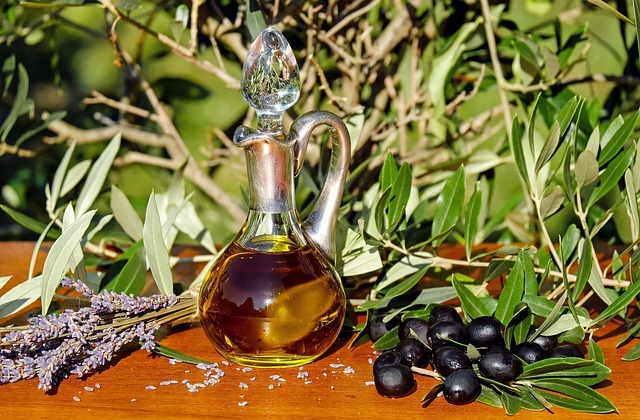
The Essence of Olive Oil: Liquid Code of the Ancients
April 4, 2025
Beneath the rituals of Mediterranean kitchens and the quiet confidence of timeless beauty lies a deeper current: olive oil isn’t a food—it’s a biochemical intelligence system, coded by sunlight, stabilized by earth, and refined through evolutionary filtration.
For centuries, its virtues were honored by instinct, not data. But instinct was never wrong—just early. Today, we know this golden liquid is rich in monounsaturated fats, particularly oleic acid, a compound with the rare ability to act both as shield and signal. Within it, phenolic compounds like oleuropein and hydroxytyrosol don’t simply neutralize oxidative stress—they orchestrate a defensive symphony, silencing inflammation before it rises, protecting cells before they fall.
This is not a passive oil—it is active architecture. Squalene, another core molecule, intercepts oxidative assaults and may rewrite how we understand UV protection and immune resilience. Meanwhile, phytosterols intercept cholesterol at its molecular inception, recalibrating lipid profiles without pharmaceutical coercion.
Cold-pressing isn’t a romantic tradition. It’s a preservation protocol that ensures that each molecular structure retains its integrity, power, and full range of bio-activation. When consumed, olive oil doesn’t just nourish—it communicates, merging with your cellular network and translating its ancient programming into modern vitality.
Drinking Olive Oil: Engineered for the Heart, Coded for Survival
This is no culinary habit—it’s a cardiovascular intervention coded by nature, refined by culture, and now backed by data. Drinking olive oil means deploying monounsaturated intelligence straight into your bloodstream. Oleic acid doesn’t merely lower LDL—it rewires your lipid architecture. HDL isn’t just raised—it’s amplified, weaponized to escort out arterial debris like an elite metabolic SWAT team.
These aren’t claims—they’re confirmed patterns. Meta-analyses reveal a clear asymmetry: those replacing carbohydrates with olive oil don’t just survive but recalibrate their cardiovascular fate. LDL is reduced. Total cholesterol drops. Inflammation silenced—the endothelium—your vascular command center—functions like a freshly oiled machine.
The PREDIMED study didn’t just nod at olive oil—it placed it on the throne. A 30% drop in cardiovascular events is not a statistical anomaly; it’s a structural breakthrough. This is vascular engineering through edible code.
Olive Oil and Diabetes: Molecular Governance of Glucose
Olive oil is a silent general in the war against metabolic decay. Its phenolic arsenal directly moderates glucose metabolism, reducing postprandial surges, enhancing insulin sensitivity, and governing pancreatic response. Olive oil doesn’t react to diabetes; it preempts it.
Consuming it regularly shifts the glycemic terrain. Insulin is no longer trapped in futile signaling loops. Instead, it gains traction—its voice heard, its instructions obeyed. This is metabolic diplomacy through dietary command.
Olive Oil for Bone Density: Liquid Scaffold for the Aging Skeleton
Osteoporosis isn’t just a breakdown of bone—it’s a collapse of structural identity. Olive oil rewrites that decay. Its polyphenols, especially hydroxytyrosol, do not act as mere antioxidants—they operate as molecular architects, stimulating osteoblasts, increasing bone matrix density, and slowing resorption.
Bones aren’t built with calcium alone—they’re reinforced through cellular conversation, and olive oil is fluent in the language of bone regeneration. With age, we don’t just lose strength—we lose complexity. Olive oil restores both.
Olive Oil and Cancer: Precision Strike Against Cellular Mutiny
Cancer is chaos at the cellular level. Olive oil responds with targeted order. Its polyphenols enter the scene not as passive antioxidants but as strategic saboteurs—inhibiting growth, inducing apoptosis, neutralizing the oxidative smog where malignant cells thrive.
Oleuropein, hydroxytyrosol, oleocanthal—these aren’t nutrients. They’re bioactive insurgents disrupting angiogenesis, stalling metastasis, and restoring normalcy to hijacked cell cycles. Science is still decoding the full playbook, but what’s clear is this: olive oil doesn’t wait for cancer—it moves first.
Olive Oil and the Mind: Neuroprotection Beyond Nutrition
In the brain, time is erosion. Neural pathways degrade. Plaques form. Memory falters. But olive oil enters with a different directive: preserve, protect, rewire. Its polyphenols fight the invisible war—reducing neuroinflammation, limiting oxidative load, and protecting synaptic integrity.
Oleocanthal breaks apart beta-amyloid with surgical precision. Neural plasticity increases, and signal-to-noise ratios in the brain improve. Olive oil becomes more than food—it becomes a cognitive stabilizer, a liquid nootropic rooted in tradition but validated by modern neuroscience.
Longevity Not as Fantasy, But Function
The total effect is a full-spectrum biological recalibration: cardiovascular resilience, glycemic control, and skeletal strength. These are not isolated benefits—they are interconnected reinforcements. Olive oil does not extend life by inches—it increases the density of each year lived.
Consuming it daily is to engage with an ancestral technology, built by sun, tree, and time—now repurposed by science to push against the limits of aging.
This isn’t just oil—it’s a liquid algorithm engineered for both palate and physiology. Olive oil doesn’t merely accompany food—it enhances taste while stealthily delivering cellular upgrades. Whether it’s cascading over roasted vegetables or seared into the skin of marinated meats, each drop carries both flavor and function.
Its rich phenolic profile activates taste receptors while its chemical stability holds strong under heat. Unlike unstable seed oils that fracture into toxic aldehydes when stressed, high-quality olive oil holds the line—resisting oxidative degradation during sautéing, roasting, and even deep frying.
And with every culinary application, the dose-response curve is quietly compounding. You’re not just eating—you’re enriching: monounsaturated fats for vascular flexibility, polyphenols for skeletal resilience, and antioxidants for neural clarity. This is food as code—rewriting outcomes at the molecular level while keeping your meals seductive.
Olive oil is also a behavioral nudge. Its satiating power tempers overconsumption, and its sensory richness encourages slower eating, deeper appreciation, and a shift toward whole food-based dishes. In this way, olive oil becomes not just an ingredient but an instigator of lifestyle recalibration.
Olive Oil: Handle with Precision
Power must be measured. Olive oil is calorie-dense, and drinking it without restraint can shift the needle in the wrong direction. Dosage matters. Quality matters more. Only extra virgin varieties contain the full spectrum of health-promoting compounds—stripped oils are stripped of value.
This isn’t about guzzling—it’s about strategic infusion. A tablespoon here, a drizzle there—used with intent, not excess.
Final Thoughts
Olive oil isn’t a health trend—it’s a biological constant dressed as a culinary choice. It delivers compounding value across biological systems, from heart health to neuroprotection, from skeletal support to metabolic refinement. What begins as a flavorful addition ends as a long-term health multiplier.
Though more research will sharpen the details, the trajectory is already clear: olive oil, when sourced correctly and used wisely, is both a shield and a sword. It is a conduit for health and a keystone in the architecture of longevity.
Choose extra virgin and use it often. Use it smart. With olive oil, you’re not just eating for today—you’re sculpting the biological architecture of tomorrow.












